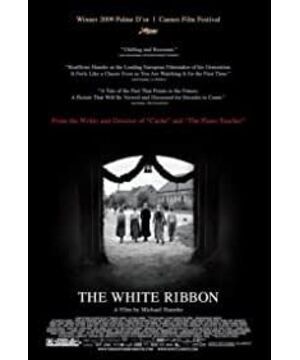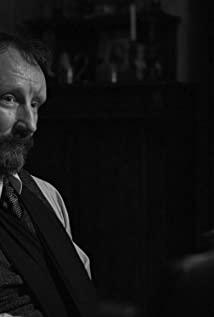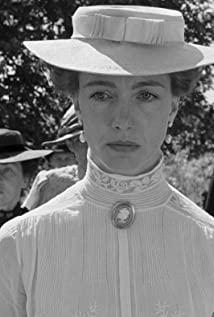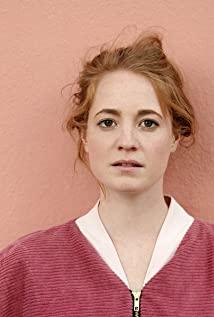The film director Haneke's most famous masterpiece is "The Piano Teacher" in 2001. The film also swept the 60th German Film Awards in 2009, including the Best Film Gold Award, Best Director, Best Actor, Best Screenplay and other 10 awards, and won the 62nd Cannes International Film Festival Gold Award Palm Award and Best Foreign Language Film at the 67th American Film Golden Globe Awards in 2010. Truly a master movie! The film adopts a rigorous lens language and a realistic narrative method, a large number of stable and still pictures, plus black and white tones, creating a cold and gloomy atmosphere, and at the same time making the film have a strong historical effect. Although it is a black and white film, it achieves a clean and transparent visual experience through textbook-style composition and light processing. Almost every picture is the best teaching material for black and white photography. Through the narration of the story witnesses - the farm tutor's memories, the director tells about the suspenseful and violent incidents that happened in the farm, and at the same time controls the content and scope of the narrative, so that the audience is always in a state of longing and speculation. Holding the audience's psychology tightly, on the other hand, the violent content of the film is full of infinite imagination space. Although the movie doesn't have any violence including blood splattering and other scenes, I still feel a unique kind of horror and fear. Through simple and refined film dialogues, the film fully expresses multiple complex characters in three dimensions with pure language and footage. For example, the sanctimonious doctor, the struggling and helpless midwife, the harsh and paranoid missionary, the children whose nature is suppressed by the old teachings, the lonely baroness who yearns for affection, the noble but cold-blooded farmer, the old tenant who loves his wife and is disappointed in life , the arrogant and impulsive son of a tenant farmer, etc., these characters are displayed on the stage of the manor in layers in the director's calm story, allowing us to see the life of a German farm on the eve of World War I in 1913-1914. social environment. What is amazing is not only the sophistication of all the adult actors in the film, but also the performance of more than a dozen children. No wonder the director said that it took 6 months to find more than 7,000 children to audition for the film. It is intriguing that the director uses superhuman intelligence to metaphorically metaphorize his true film theme in broken images and limited perspectives. First, the audience can see that the dramatic conflict of the film revolves around two relationships: the tenant and the farmer (the baron), the adults (especially the father) and the children. These two conflicts and contradictions also reflected the problems of social relations (class structure) and humanistic spirit (individual psychology) in Germany at that time, and these two levels happened to be macroscopic. and micro-interacting unity. It can be clearly seen that negative issues such as violence, hypocrisy, authoritarianism, abuse, arbitrariness, perversion, incest have a huge impact on the psychology of children, the most vulnerable group of social relations, although we cannot be sure from the movie that the manor happened Whether the continuous violence is the work of children, even if it is already very shocking, what is more noteworthy and thoughtful is that when these children become mature citizens 20 years later, it was the Nazis who came to power and brought the world into the first place. During World War II. These young adults, who had been psychologically influenced by strict authoritarianism and fear of freedom as children, became Hitler's main force in World War II. From a psychological point of view, the psychological influences and moral norms experienced in childhood and adolescence are infinitely magnified and manifested in adulthood. In 1933, the famous Austrian psychologist Wilhelm Reich, a disciple of Freud, pointed out in "The Mass Psychology of Fascism" that "Fascism" is not the characteristic of some peoples, but the common people. The organized political expression of character structure is the basic emotional attitude of repressed people in authoritarian machine civilization. The economic crisis before the First World War hit the traditional German "patriarchal" family that was already on the verge of collapse, and the authoritarian psychology condensed in Clara, Martin and other children is always looking for a strong father image, Hitler's authoritative image Being able to replace the traditional "patriarchy" allows the public to regain a "sense of security". Clearly, Reich and Haneke's perspectives are fundamentally the same. Looking back, we know the director's good intentions: we must constantly summarize and review the existence and development of human society and individual human beings, reflect on and be alert to the root causes of various social phenomena. It can be seen from this film that European films and American Hollywood films are walking in two completely different directions. The latter pursues newer technology, more advanced expression techniques and fresher audio-visual experience, and pays attention to the effect of film on the audience. All-round sensory experience; while the former pays more attention to the core of the film, focusing on the analysis and reflection of humanistic themes, emphasizing the inner infection and spontaneous thinking caused by the film to the audience, even if only the most simple and concise expression techniques and techniques are used. It seems that the films of Taiwanese directors Tsai Ming-liang, Hou Hsiao-hsien, and Yang Dechang Deng are all deeply influenced by European academic films, and have similar directions in terms of film style and presentation themes. Whether the continuous violence is the work of children, even if it is already shocking, it is even more noteworthy and thoughtful that these children will become full-fledged citizens 20 years later, when the Nazis came to power and brought the world into During World War II. These young adults, who had been psychologically influenced by strict authoritarianism and fear of freedom as children, became Hitler's main force in World War II. From a psychological point of view, the psychological influences and moral norms experienced in childhood and adolescence are infinitely magnified and manifested in adulthood. In 1933, the famous Austrian psychologist Wilhelm Reich, a disciple of Freud, pointed out in "The Mass Psychology of Fascism" that "Fascism" is not the characteristic of some peoples, but the common people. The organized political expression of character structure is the basic emotional attitude of repressed people in authoritarian machine civilization. The economic crisis before the First World War hit the traditional German "patriarchal" family that was already on the verge of collapse, and the authoritarian psychology condensed in Clara, Martin and other children is always looking for a strong father image, Hitler's authoritative image Being able to replace the traditional "patriarchy" allows the public to regain a "sense of security". Clearly, Reich and Haneke's perspectives are fundamentally the same. Looking back, we know the director's good intentions: we must constantly summarize and review the existence and development of human society and individual human beings, reflect on and be alert to the root causes of various social phenomena. It can be seen from this film that European films and American Hollywood films are walking in two completely different directions. The latter pursues newer technology, more advanced expression techniques and fresher audio-visual experience, and pays attention to the effect of film on the audience. All-round sensory experience; while the former pays more attention to the core of the film, focusing on the analysis and reflection of humanistic themes, emphasizing the inner infection and spontaneous thinking caused by the film to the audience, even if only the most simple and concise expression techniques and techniques are used. It seems that the films of Taiwanese directors Tsai Ming-liang, Hou Hsiao-hsien, and Yang Dechang Deng are all deeply influenced by European academic films, and have similar directions in terms of film style and presentation themes. Whether the continuous violence is the work of children, even if it is already shocking, it is even more noteworthy and thoughtful that these children will become full-fledged citizens 20 years later, when the Nazis came to power and brought the world into During World War II. These young adults, who had been psychologically influenced by strict authoritarianism and fear of freedom as children, became Hitler's main force in World War II. From a psychological point of view, the psychological influences and moral norms experienced in childhood and adolescence are infinitely magnified and manifested in adulthood. In 1933, the famous Austrian psychologist Wilhelm Reich, a disciple of Freud, pointed out in "The Mass Psychology of Fascism" that "Fascism" is not the characteristic of some peoples, but the common people. The organized political expression of character structure is the basic emotional attitude of repressed people in authoritarian machine civilization. The economic crisis before the First World War hit the traditional German "patriarchal" family that was already on the verge of collapse, and the authoritarian psychology condensed in Clara, Martin and other children is always looking for a strong father image, Hitler's authoritative image Being able to replace the traditional "patriarchy" allows the public to regain a "sense of security". Clearly, Reich and Haneke's perspectives are fundamentally the same. Looking back, we know the director's good intentions: we must constantly summarize and review the existence and development of human society and individual human beings, reflect on and be alert to the root causes of various social phenomena. It can be seen from this film that European films and American Hollywood films are walking in two completely different directions. The latter pursues newer technology, more advanced expression techniques and fresher audio-visual experience, and pays attention to the effect of film on the audience. All-round sensory experience; while the former pays more attention to the core of the film, focusing on the analysis and reflection of humanistic themes, emphasizing the inner infection and spontaneous thinking caused by the film to the audience, even if only the most simple and concise expression techniques and techniques are used. It seems that the films of Taiwanese directors Tsai Ming-liang, Hou Hsiao-hsien, and Yang Dechang Deng are all deeply influenced by European academic films, and have similar directions in terms of film style and presentation themes. Come. In 1933, the famous Austrian psychologist Wilhelm Reich, a disciple of Freud, pointed out in "The Mass Psychology of Fascism" that "Fascism" is not the characteristic of some peoples, but the common people. The organized political expression of character structure is the basic emotional attitude of repressed people in authoritarian machine civilization. The economic crisis before the First World War hit the traditional German "patriarchal" family that was already on the verge of collapse, and the authoritarian psychology condensed in Clara, Martin and other children is always looking for a strong father image, Hitler's authoritative image Being able to replace the traditional "patriarchy" allows the public to regain a "sense of security". Clearly, Reich and Haneke's perspectives are fundamentally the same. Looking back, we know the director's good intentions: we must constantly summarize and review the existence and development of human society and individual human beings, reflect on and be alert to the root causes of various social phenomena. It can be seen from this film that European films and American Hollywood films are walking in two completely different directions. The latter pursues newer technology, more advanced expression techniques and fresher audio-visual experience, and pays attention to the effect of film on the audience. All-round sensory experience; while the former pays more attention to the core of the film, focusing on the analysis and reflection of humanistic themes, emphasizing the inner infection and spontaneous thinking caused by the film to the audience, even if only the most simple and concise expression techniques and techniques are used. It seems that the films of Taiwanese directors Tsai Ming-liang, Hou Hsiao-hsien, and Yang Dechang-Deng are all deeply influenced by European academic films, and they all have similar directions in terms of film style and presentation themes. Come. In 1933, the famous Austrian psychologist Wilhelm Reich, a disciple of Freud, pointed out in "The Mass Psychology of Fascism" that "Fascism" is not the characteristic of some peoples, but the common people. The organized political expression of character structure is the basic emotional attitude of repressed people in authoritarian machine civilization. The economic crisis before the First World War hit the traditional German "patriarchal" family that was already on the verge of collapse, and the authoritarian psychology condensed in Clara, Martin and other children is always looking for a strong father image, Hitler's authoritative image Being able to replace the traditional "patriarchy" allows the public to regain a "sense of security". Clearly, Reich and Haneke's perspectives are fundamentally the same. Looking back, we know the director's good intentions: we must constantly summarize and review the existence and development of human society and individual human beings, reflect on and be alert to the root causes of various social phenomena. It can be seen from this film that European films and American Hollywood films are walking in two completely different directions. The latter pursues newer technology, more advanced expression techniques and fresher audio-visual experience, and pays attention to the effect of film on the audience. All-round sensory experience; while the former pays more attention to the core of the film, focusing on the analysis and reflection of humanistic themes, emphasizing the inner infection and spontaneous thinking caused by the film to the audience, even if only the most simple and concise expression techniques and techniques are used. It seems that the films of Taiwanese directors Tsai Ming-liang, Hou Hsiao-hsien, and Yang Dechang Deng are all deeply influenced by European academic films, and have similar directions in terms of film style and presentation themes. The fresh audio-visual experience focuses on the all-round sensory experience of the movie for the audience; while the former pays more attention to the core of the movie, focuses on the analysis and reflection of the humanistic theme, and emphasizes the inner infection and spontaneous thinking caused by the movie to the audience, even if only the most Simple and concise presentation techniques and techniques. It seems that the films of Taiwanese directors Tsai Ming-liang, Hou Hsiao-hsien, and Yang Dechang Deng are all deeply influenced by European academic films, and have similar directions in terms of film style and presentation themes. The fresh audio-visual experience focuses on the all-round sensory experience of the film for the audience; the former pays more attention to the core of the film, focuses on the analysis and reflection of the humanistic theme, and emphasizes the inner infection and spontaneous thinking caused by the film to the audience. Simple and concise presentation techniques and techniques. It seems that the films of Taiwanese directors Tsai Ming-liang, Hou Hsiao-hsien, and Yang Dechang Deng are all deeply influenced by European academic films, and have similar directions in terms of film style and presentation themes.
View more about The White Ribbon reviews










